Sumi’s Smile: A Caregiving Love Story
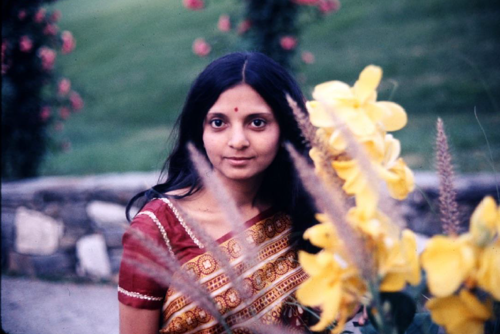
You don’t know what’s behind
All you have is this moment
Translated from “Aage Bhi Jaane Na Tu”, song from the 1965 Hindi (Indian) movie Waqt, sung by Asha Bhosle with music by Ravi and lyrics by Sahir Ludhianvi
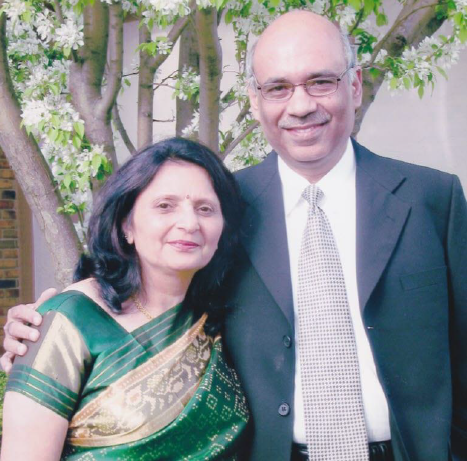
A former engineering executive at Chrysler, KC analyzed the situation. He hoped for a misdiagnosis, read all the books he could get his hands on and eventually, turned to soul searching and reflection. Initially, he wanted to change Sumi, but he learned that he needed to change in order to best meet her needs.
“My life now has a clear focus. Sumi has given me purpose. I am learning the true meaning of love and how to practice it daily.”
Finding Sumi
After growing up in Mumbai, India, KC came to the United States in the 1970s, earned a master’s degree in mechanical engineering from the University of California, Berkeley and eventually settled in Philadelphia for work. He secured his green card in 1974.
At 26, he returned to India to find a bride at the urging of his family. His parents had arranged a meeting with a young woman but KC wasn’t enamored. “I do not like her,” he told them. Other relatives got in on the matchmaking and KC pursued a meeting with a different young lady. He met her briefly at her home and then later, on a formally arranged outing.
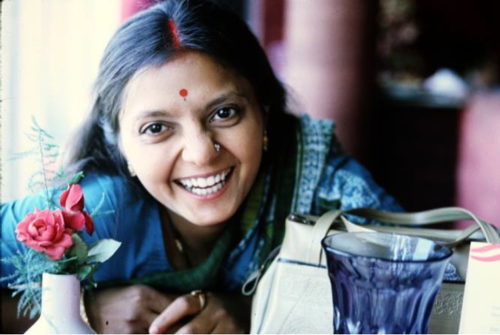
“On many nights when I looked at the night sky and the occasional shooting star, the image of the casually dressed girl I saw for the first time in Vijapur kept flashing in my mind,” he said. “My longing for her only continued to grow and I decided that she was the right life partner for me.”
The girl, of course, was Sumi. They married quickly and settled together in the U.S. Over the next 40 years, they raised a family in Michigan and pursued their version of the American dream.
Life was grand, until it wasn’t. KC started noticing changes in Sumi. She’d forget a detail or grow confused about a conversation. She left the stove on when she stepped out. She became hopelessly lost when driving to a nearby friend’s house. On that occasion, KC ended up calling the police for help locating her and she finally arrived home hours later distraught and unable to explain what had happened or where she’d been.
After many tests, Sumi was officially diagnosed with Alzheimer’s disease at the age of 59 on April 24, 2013, “the saddest day of our lives,” KC recalls. He was devastated. “Sumi, in her innocent, positive and compassionate way was more concerned about seeing me cry. She tried to console me and didn’t think about the full gravity of her own health and what it would do to her as time passed.”
This post is the first in a series of three. Check back tomorrow for “Sumi 2.0: Becoming Sumi’s Care Partner”.
Last year, KC was one of six family caregivers honored by Area Agency on Aging 1-B, based on an essay he submitted to the organization’s “Caregiver Champions Contest”. If you’re a caregiver in need of advice or support, your local Area Agency on Aging can be a great resource for classes, support groups and even advice on finding respite care.
Click here to read on-line.
Sumi 2.0: Becoming Sumi’s Care Partner
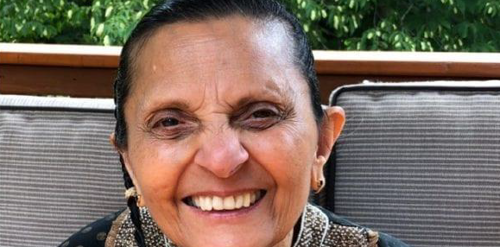
There is a Sumi that exists before Alzheimer’s and a Sumi that lives now. KC straddles both worlds, trying to be present for “Sumi 2.0” as he affectionately refers to her. One thread that ties the old Sumi to the new is her smile, the one KC thought of under the stars all those years ago and the one that still gives him purpose today.
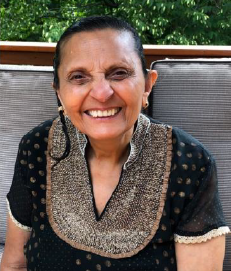
He’s developed charts to try to help others see what they might experience.
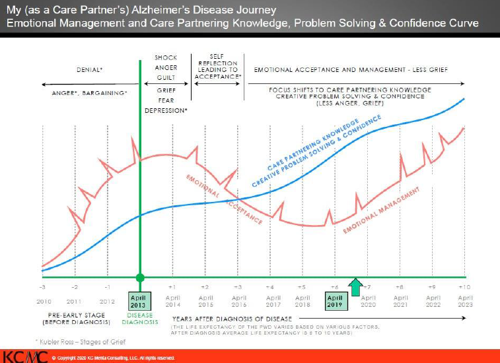
He channeled those feelings into caring for and with Sumi. He serves as her hands when she needs him, but he also empowers her to perform tasks she’s still able to. They work together. “It cultivates love, mercy, compassion and patience,” he said. “It has taught me to control the controllable and manage the uncontrollable.”
Creative problem solving is one way KC puts his engineering background to work in caring for Sumi. He’s fitted a PVC cover on their shower handle to prevent Sumi from accidentally changing the temperature to a degree too cold or hot. When she was having a hard time eating because her plate would slip and slide on their table, he found a grippy placemat. Putting her smoothie in a bowl with a spoon helped her still get valuable nutrition when she didn’t want to drink out of a straw anymore. Watermelon keeps her hydrated when she doesn’t feel like drinking enough water.
Changing his emotional response has also been instrumental. “Emotional acceptance and management means recognizing that Sumi is slowly changing in front of me. Sumi is not a problem to be solved but someone to be cared for deeply with love, compassion, patience and mindfulness.”
He’s even found humor in how his reactions and care toward Sumi have changed. Before the Alzheimer’s diagnosis, Sumi’s snoring at night annoyed him.
“The same snoring used to bother me, now it’s a delight to me,” he said.
As her disease has progressed, KC’s charts show increasing confidence in his problem-solving skills as they relate to caretaking and his emotional acceptance and management. He acknowledges, however, that the emotional line isn’t a straight upward path – there are sharp highs and valleys. He expects the line to continue to change, especially as he contemplates losing his wife of so many years.
“No matter how much you’re prepared for it, you’re never prepared,” he said.
Raised in a competitive Indian society, KC said he exemplified “alpha male traits” at home and at work. He hated to lose arguments but now often finds himself letting petty grievances go, all for his Sumi and their harmony together.
“It feels good to purposely lose a point,” he said. “And I wish I had developed this awareness of letting go earlier in my life.”
This post is the second in a series of three. Check back tomorrow for “Coping as Sumi’s Caregiver”. Last year, KC was one of six family caregivers honored by Area Agency on Aging 1-B, based on an essay he submitted to the organization’s “Caregiver Champions Contest”. If you’re a caregiver in need of advice or support, your local Area Agency on Aging can be a great resource for classes, support groups and even advice on finding respite care.
Click here to read on-line.
Coping as Sumi’s Caregiver
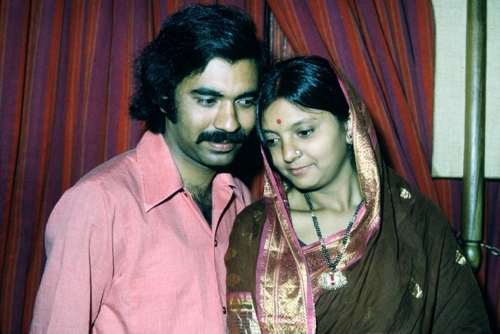
Editor’s note: This is the last post in a three-part blog series about KC Mehta’s experience caring for his wife, Sumi, who was diagnosed with Alzheimer’s disease at 59. Read the first post, “Sumi’s Smile: A Caregiving Love Story”, here, and the second, “Sumi 2.0: Becoming Sumi’s Care Partner”, here.
In the image above, KC and Sumi enjoy a moment as newlyweds.
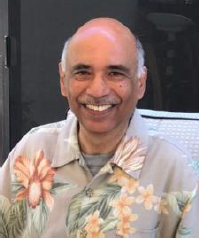
KC, like many caregivers, faces isolation and loneliness because of the all-consuming nature of the work he does to keep Sumi cared for.
“With a few exceptions, isolation from close friends and relatives is one casualty of this disease,” he said.
To cope, he focuses on the present, making sure to carve out time for his physical, mental and emotional wellbeing. He channels his feelings through writing on WhatsApp – “My Journey with Sumi” is an online journal he shares with close family and friends to keep them updated. It helps him process his emotions and offers a glimpse into their life together.
He makes time for exercise and meditation, enjoys listening to music with Sumi and continues his love of gardening and cooking. Hiring a part-time, in-home caregiver has allowed him to take part in art classes and support groups geared toward caregivers, which have been a powerful outlet, connecting him to others on the same caregiving path.
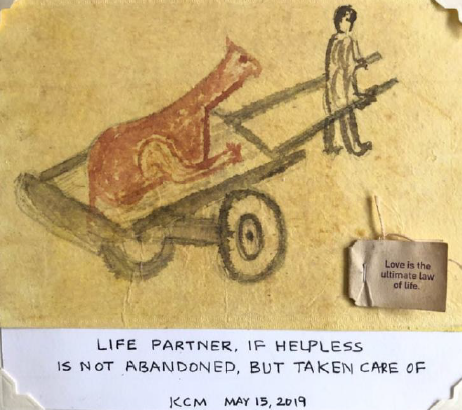
He’s happy that Sumi is still able to stay home and that he can provide one-on-one, person-centered care that makes her comfortable. He feels the familiar sights, smells and comforts of home, including the couple’s shared Indian culture, language and food, have made life better for Sumi, acknowledging that isn’t possible for everyone in the same situation.
“My goal is to keep her at home as long as I can,” KC said.
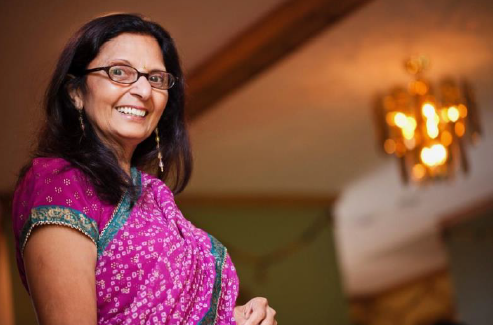
“When (Sumi) is extremely difficult it is not her, but the disease,” KC said. “And when she smiles, it is her true self and not the disease.”
Last year, KC was one of six family caregivers honored by Area Agency on Aging 1-B, based on an essay he submitted to the organization’s “Caregiver Champions Contest”. If you’re a caregiver in need of advice or support, your local Area Agency on Aging can be a great resource for classes, support groups and even advice on finding respite care.
